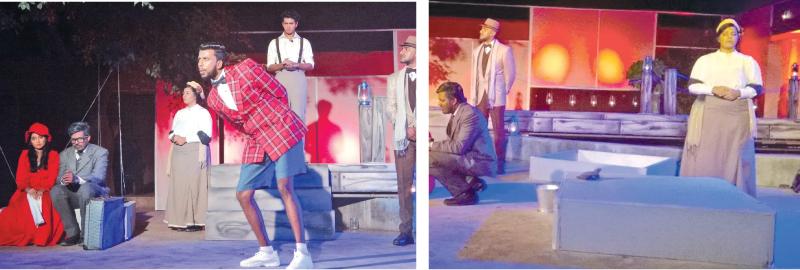
The open air amphitheatre of the Western Province Aesthetic Resort played venue to the latest production by Cue Theatre Co., Eurydice. A play written by the U.S playwright Sarah Ruhl, the play was directed by Ranga Jayaratne, featured a host of young thespians and had a two night show run from September 9-10. Yours truly caught the show on closing night, through the kind invitation of the theatre promotion outfit - Drama SriLanka founded and managed by Yohan Ferreira.
Ruhl’s Eurydice is an adaptation from the Greek myth of Orpheus and Eurydice, rendered into a modern day fairy tale like story. In this rendition of remoulding an ancient Greek legend Ruhl shows a scheme of maintaining the essence of what the original Grecian love tragedy is known for, within a more present day narrative style and structure. The postmodernist approach of Ruhl in Eurydice seems to carry the desire of evincing its pre-existence in another form, in another time, before finding its way into this age. Despite all the modern clothing and style of speech, the names of the two star crossed lovers in the Grecian legend remain unchanged in Eurydice. And thus those names, which seem somewhat incongruous with modern veneer, act almost as conduits between the ages; of stories misted as mythology and stories reborn to an age of ‘reality’ bound to the supremacy of science and technology.
In the heart of Eurydice is an investigation as to what degrees of love keep us bound to a particular way of life, and what that life’s ‘worth’ is in its sum total. And what are the extents of your sacrifices willingly made for the ones you love?
The directorial vision for a non-proscenium production of Eurydice must be applauded. Clearly, Jayaratne had designed a commendable setup in the chosen venue that offered freshness to theatregoers. Costumes and makeup were very well done; lighting and music played a significant effect and was well handled.
The opening scene between the young actors, Eurydice and Orpheus, played by Sarah Nimaladasa and Rishan Hannan respectively, could have been improved for its chemistry. Hannan throughout his performance had a fibre of woodenness that made him seem almost a ‘cued’ player. He delivered visual ‘presence’ with his visage but clearly needed to enter his character without being overly conscious of ‘the need to act’. Nimaladasa showed commendable mettle for a novice and shows promise for the English theatre scene. I did find it rather interesting that her interplay with the character of her father was much more convincing that with Orpheus. The paternal-filial entwining of character connectivity was more noticeable compared to the pallid chemistry between lovers that unfolded in the performance.
The three players who played the roles of the ‘stones’ in the underworld must be commended for the role they played. Staying fixed in a perfect ‘virtue of stillness’ for varying lengths of time and delivering dialogue without falter in enunciation or timing is not the easiest task in the world.
The cast consisted of Sarah Nimaladasa, Rishan Hannan, Lahiru Fernando, Merisha Dias, Jaan Fernando, Menusha Hannan, and Kasun Liyanage. The overall performance by the greenhorn cast in Eurydice by Cue Theatre Co. was appreciable, however they do, I believe, need to better their skills as actors if they are serious about furthering their position and name in Sri Lanka’s arena of Colombo centric English theatre, which is growing in size and competitiveness with each passing year.
That being said, I shall conclude this review by noting that the overall passion for theatre in the Cue Theatre Co. team which was evinced through their production of Eurydice is commendable and merits applause.
